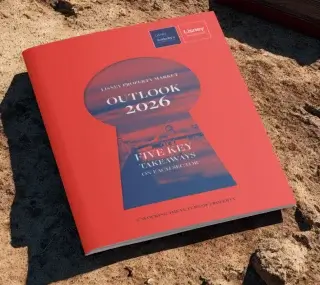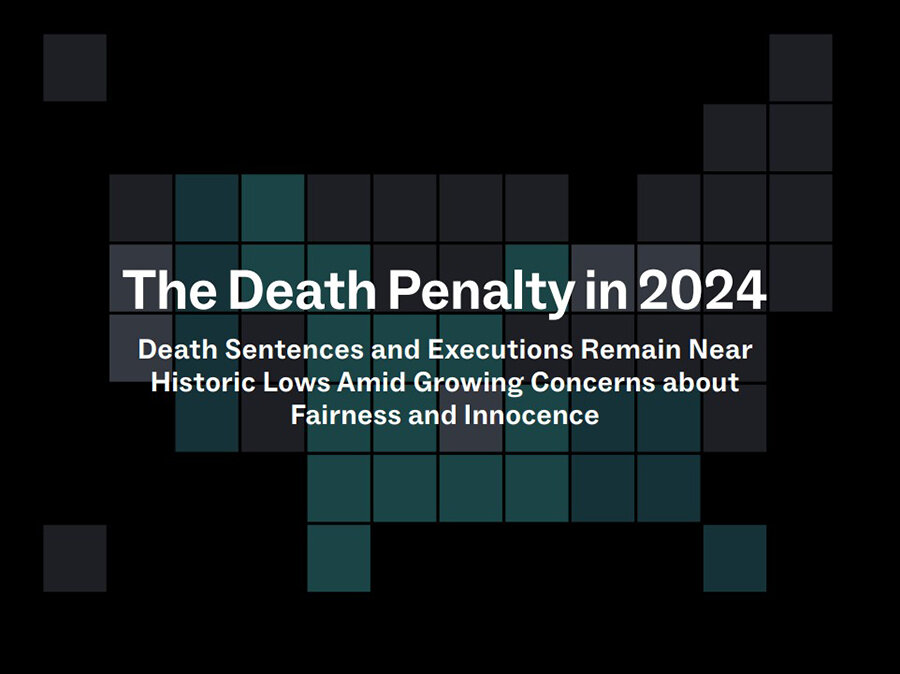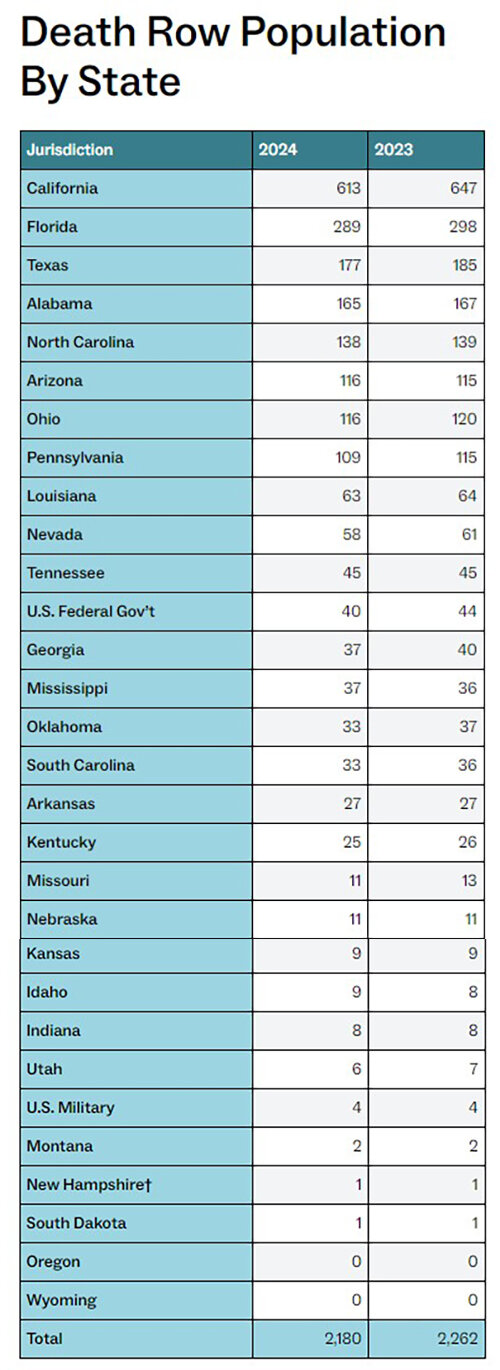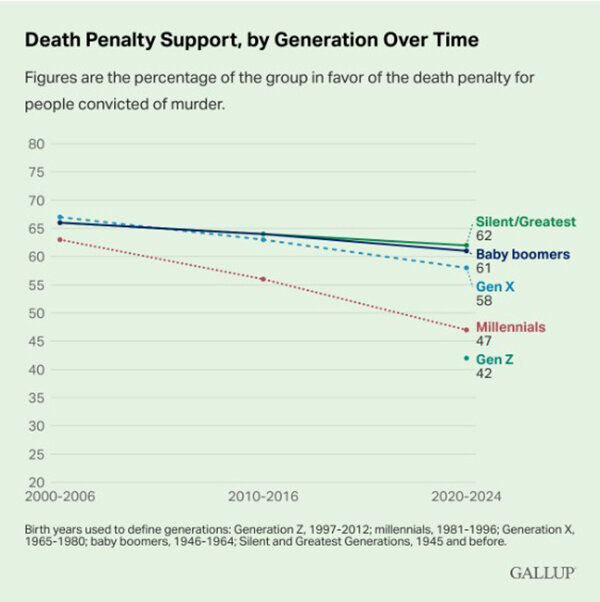read also
 Iceland’s Four-Day Workweek Five Years On
Iceland’s Four-Day Workweek Five Years On
 Mortgage Approvals in Ireland Slump Sharply in January
Mortgage Approvals in Ireland Slump Sharply in January
 Lisney Property Market Outlook: Irish Property Market Poised for Steady Growth in 2026
Lisney Property Market Outlook: Irish Property Market Poised for Steady Growth in 2026
 Inflation in Romania Slows to 9.6% but Remains Above Forecast
Inflation in Romania Slows to 9.6% but Remains Above Forecast
 Riots in Mexico Disrupt Air Links to Resort Destinations
Riots in Mexico Disrupt Air Links to Resort Destinations
 UK House Prices Stabilise After 2025 Slowdown
UK House Prices Stabilise After 2025 Slowdown

The death penalty is no longer a part of American history, stated the Death Penalty Information Center. In 2024, it became a relic of another era in most U.S. states. In 34 states, the death penalty is either abolished or has not been used in over a decade. However, Alabama, Texas, Missouri, and Oklahoma accounted for 76% of executions in 2024, and Donald Trump planned to expand its use in 2025.
In 2024, 25 executions were carried out across nine states. Utah, South Carolina, and Indiana conducted executions for the first time in more than a decade. Alabama became the first state to use nitrogen gas for executions. The table below presents data on the number of individuals sentenced to death in each state.

In most parts of the U.S., the death penalty is barely a topic of discussion. Politicians running for public office have largely ignored it; neither major political party included it in their platforms, nor was it a topic in the presidential campaign. In national voter polls, it was not a priority issue.
According to a study conducted by Gallup in October 2024, support for the death penalty in the U.S. remains at its lowest level in five decades. Overall, Gallup found that 53% of Americans support capital punishment. However, more than half of respondents aged 18 to 43 now oppose it.

Among those who identified their political affiliation, support for the death penalty declined across all groups and generations—except for Republicans aged 60 and older, where support increased by 2%. Public support for capital punishment peaked 30 years ago in 1994 when 80% of Americans favored the death penalty for those convicted of murder.
The divide between supporters of the two main political parties reflects declining support for the death penalty among Democrats, independents, and younger Republicans. Among older Republicans, support has remained stable over the past 25 years, while among Democrats aged 60 and older, it has dropped by 11% since 2016. Among younger Democrats, support has declined even more—by 18% compared to 2016.
Among older Republicans, support for the death penalty slightly increased (this was the only group in the Gallup poll where support rose), while among younger Republicans, it decreased by 4%. The trend among independent voters mirrored that of Democrats but was less pronounced: support for the death penalty among older independents declined by 6%, while among younger independents, it dropped by 10%.
A Gallup poll conducted in May 2024 found that the number of Americans who consider the death penalty morally acceptable has declined: only 55% now hold this view, down 8% from the previous year. Meanwhile, 39% of respondents said that the death penalty is morally unacceptable, a 15% increase from 2023. Moral support for capital punishment peaked in 2006 at 76%.
An earlier poll by Saint Louis University and YouGov found that 52% of respondents in Missouri supported Governor Mike Parson’s decision to commute all death sentences to life imprisonment without parole. A 2024 study also found that most Ohio voters prefer life imprisonment over the death penalty.
High-profile media coverage, public protests, and support from unlikely allies in the cases of Marcellus “Khalifa” Williams, Robert Roberson, and Richard Glossip raised the issue of wrongful convictions in 2024. On December 23, President Joe Biden commuted the sentences of 37 out of 40 federal death row inmates. On December 31, North Carolina Governor Roy Cooper commuted the death sentences of 15 men to life imprisonment without parole.
At least six states enacted laws in 2024 that restricted the use of the death penalty, modified execution methods, or changed execution protocols. More than a dozen states are continuing efforts to abolish capital punishment, while eight states have attempted to reinstate it, though without success so far.
The U.S. Supreme Court has largely stepped back from its historical role in regulating and limiting the use of the death penalty. Attorney General Merrick Garland imposed a moratorium on federal executions immediately after taking office in 2021. However, the Department of Justice has continued to defend existing federal death sentences despite longstanding concerns about racial disparities and injustice. President-elect Donald Trump has expressed strong support for the death penalty and oversaw 13 federal executions in the last six months of his first term. He has pledged to expand the use of capital punishment in 2025.
The death penalty has been abolished in law or practice in most of the world’s countries (144 in total). In 2024, four more countries took steps to abolish it. Nevertheless, global executions increased for the third consecutive year, with Iran leading in the number of executions.


